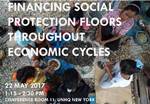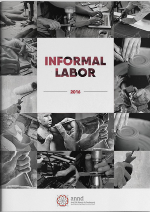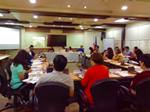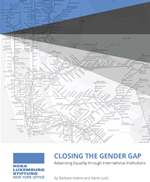Social Watch news
Published on Fri, 2017-05-19 14:00
A new report examines the role that multi-stakeholder partnerships play in the implementation of the SDGs. The report warns of the risks, side-effects and dangers, as well as the opportunities, of such partnerships. The contributions deal with some of the major global partnerships in the area of food security, renewable energy and data availability.
|
Published on Wed, 2017-05-17 12:03
Social protection is crucial to build resilience and empower people in tough economic times. It can also spur inclusive growth and productivity in good times if adequate public financing is provided throughout the economic cycle. This event will discuss concrete experiences and options to finance fiscally sustainable social protection systems, including floors, in prosperous and adverse economic times.
|
Published on Fri, 2017-05-12 15:43
“Informal labor is not a marginal issue in Arab countries. It is a core component of modern Arab economies and the distribution of work therein and is doomed to expand under current policies,” explained Samir Aita, lead researcher of the Arab NGO Network on Development (ANND) at the launch of the 2017 edition of the Arab Watch on Economic and Social Rights, last May 8 in Beirut.
The report, launched publicly at the American University, concludes that the “highest percentages of lack of formality are in countries with the least strict laws and bureaucracies, and vice versa. This goes against the stereotype that says that informality is a result of strict laws and bureaucracies.” It also concludes that “informal labor in Arab countries is mostly waged labor, except in rare cases, which contradicts another idea that says that informal labor is a choice, as young people entering the job market have no choice but to find any type of livelihood, no matter how fragile or temporary.”
|
Published on Thu, 2017-04-27 16:05
To show that it takes the 2030 Agenda seriously, Switzerland needs to look at the damaging impact of its international financial and fiscal policies, argues Eva Schmassmann, from the Swiss coalition of development organizations Alliance Sud. "With over 3,000 billion USD of managed foreign assets, Switzerland – as a financial center – is the largest offshore haven in the world and one of the preferred low tax areas for global companies. Developing countries are losing billions in income that they could be using to implement sustainable development because of legal and illegal tax optimization techniques".
|
Published on Thu, 2017-04-27 15:53
“The universal and potentially 'transformative' character of the USPF has broad appeal to many rights-based advocates", explained Victoria Raquiza, convenor of Social Watch Philippines at the start of a debate convened by SWP and UNICEF in Manila, last April 26. “While acknowledging the strides made in social protection such as through the conditional cash transfer program (Pantawid Pamilya), PhilHealth and pensions for the elderly, social protection remains fragmented, inaccessible and unreachable to many Filipinos."
Speakers from the governmental Department of Social Welfare and Development, National Anti-Poverty Commission, and the Coalition of Services of the Elderly reacted to the propositions of UNIEF, the ILO and Social Watch Philippines.
|
Published on Thu, 2017-04-27 10:37
The 2017 meeting of the UN Commission on the Status of Women agreed on the need for “progressive tax systems, improved tax policy, more efficient tax collection and increased priority on gender equality and the empowerment of women in official development assistance”. This call for an independent global tax body in connection with women, along with the call on Member States to strengthen government oversight of PPPs is significant. Does it perhaps signal a new willingness of CSW to take on constraints to women’s rights and empowerment beyond the national level?
|
Published on Wed, 2017-04-19 18:16
All major presidential candidates promise in their platforms to increase the French development cooperation contribution to 0.7 per cent of GDP and yet "I bet you a bottle of champagne that whoever gets elected, when we gather again five years from now that promise will not have been met".
Jean-Michel Severino, the author of the bet, was speaking on behalf of Emmanuel Macron in a public debate about French international relations and development cooperation among representatives from the five leading presidential candidates, a contest so close that four of them are deemed likely to pass to the second and final round next May.
|
Published on Mon, 2017-04-10 16:38
Almost 22 years have passed since the Fourth World Conference on Women was held in Beijing, marking a turning point for women’s rights activists around the world. For many, the approved Declaration and Platform for Action represented a moment of vindication for the rights, living experiences, and human dignity of women everywhere. But the promises made in Beijing regarding the indivisibility of human rights, gender equality, and the empowerment of women and girls were not fulfilled, and it is in the socioeconomic field where this deficit strikes one of its hardest blows.
|
Published on Mon, 2017-04-10 16:30
Men and women are different. That shouldn’t be news, but today it is. Today, the government released the first federal budget that includes a look at the differences between men and women. Differences like the fact that women are twice as likely to work part-time, do more hours of unpaid care work, are less likely to qualify for Employment Insurance and are more likely to be the victim of a violent crime.
For public spending to be effective, we need policies and programs that respond to those differences. More targeted policy is more effective policy. Otherwise we could just divide up the budget by 37 million Canadians and send everyone a cheque.
|
|
Source: 
. Published on Fri, 2017-03-24 00:00
Alla vigilia del Vertice di Roma, occasione in cui i Leader dei Paesi UE si apprestano a celebrare il sessantesimo anniversario dei Trattati di Roma e discutere del futuro dell’UE, oltre 7.000 organizzazioni della società civile hanno inviato una lettera congiunta ai leader dei 10 Paesi Membri impegnati da tre anni nel negoziato per l’introduzione di una Tassa europea sulle Transazioni Finanziarie (TTF). Il futuro dell’UE passa anche dall’adozione di misure come questa che rappresentano una risposta concreta alle istanze dei cittadini sempre più schiacciati da politiche che privilegiano il potere di pochi a discapito del benessere di tutti.
|
SUSCRIBE TO OUR NEWSLETTER
Submit

|












